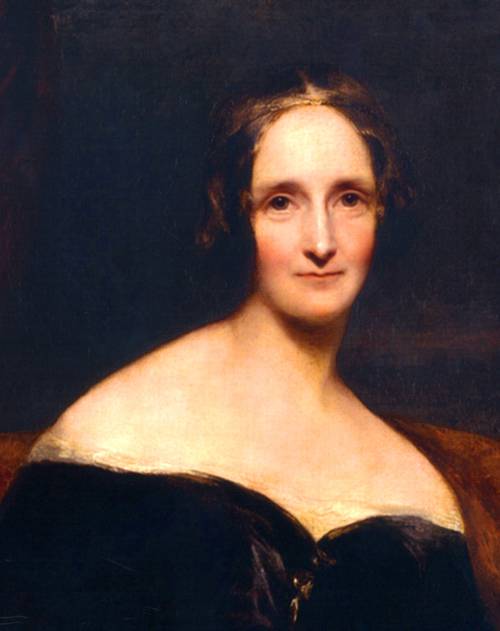
FAQ About Mary Wollstonecraft Shelley

Who was Mary Wollstonecraft Shelley?
Mary Wollstonecraft Shelley was a renowned English writer born on August 30, 1797, in London. She is best known for her groundbreaking novel Frankenstein; or, The Modern Prometheus, published in 1818. Shelley was the daughter of the political philosopher William Godwin and the famous feminist Mary Wollstonecraft. Shelley's work is often celebrated for its innovative exploration of themes like the dangers of unrestrained scientific ambition and the nature of human existence.

What is the significance of Mary Shelley's novel 'Frankenstein'?
Mary Shelley's Frankenstein is considered a seminal work in Gothic literature and one of the earliest examples of science fiction. Published in 1818, it tells the story of Victor Frankenstein, a scientist who creates a sentient creature, which leads to tragic consequences. The novel explores themes such as the quest for knowledge, the ethical implications of scientific experimentation, and the existential dilemmas of creator and creation, making it a profound commentary on the human condition.

How did Mary Shelley's parents influence her literary career?
Mary Shelley's parents were influential intellectual figures. Her father, William Godwin, was a political philosopher, and her mother, Mary Wollstonecraft, was an acclaimed feminist writer and philosopher. Although her mother died shortly after her birth, Shelley was exposed to her works and ideas. Her father ensured she received an excellent education, encouraging her literary talents and critical thinking skills, which significantly impacted her development as a writer.

What are some other notable works by Mary Shelley besides 'Frankenstein'?
Besides Frankenstein, Mary Shelley authored several other works, including novels, short stories, and essays. Notably, she wrote Valperga (1823), The Last Man (1826), and Lodore (1835). Her later works often delved into historical and socio-political themes, reflecting her interest in addressing philosophical and ethical debates of her time.

What challenges did Mary Shelley face in her personal life?
Mary Shelley encountered numerous challenges throughout her life. She lost her mother soon after birth, and her romantic involvement with the poet Percy Bysshe Shelley was met with societal disapproval, leading to social ostracism. She suffered the loss of three of her four children at young ages, faced the death of her husband, and encountered financial difficulties. Despite these hardships, she continued to write and contribute to literature.

How did Mary Shelley's relationship with Percy Bysshe Shelley influence her work?
Mary Shelley's relationship with Percy Bysshe Shelley greatly influenced both her personal life and her literary career. The couple shared a profound intellectual bond, often discussing literature, philosophy, and politics. Percy encouraged Mary in her writing endeavors and was supportive of her work. Their travels and experiences together provided inspiration and material for her novels and stories.

What impact did 'Frankenstein' have on literature and culture?
Frankenstein has had a lasting impact on literature and culture. It established many conventions of the Gothic horror and science fiction genres, addressing themes such as the limits of human ambition and the ethical dimensions of scientific experimentation. The novel's cultural influence extends to depictions in films, plays, and other media, making Frankenstein's monster an iconic figure representing the unintended consequences of human actions.

What themes are explored in Mary Shelley's 'The Last Man'?
In Mary Shelley's apocalyptic novel The Last Man, published in 1826, themes of isolation, survival, and the impact of plagues on human civilization are explored. Set in a future where humanity is nearly wiped out by a pandemic, the novel delves into issues of political, social, and personal resilience. It reflects Shelley's philosophical concerns about human mortality and the impermanence of society.

How did Mary Shelley's upbringing influence her worldview?
Mary Shelley's upbringing in a household that valued intellectual and political debate significantly influenced her worldview. Her father William Godwin's progressive ideas and the philosophical legacy of her mother Mary Wollstonecraft instilled in her a skeptical and questioning approach to societal norms. This foundation is evident in her literary works, which often challenge conventional thinking and explore social and ethical issues.

What is the plot of Mary Shelley's novel 'Valperga'?
In the historical romance novel Valperga, published in 1823, Mary Shelley weaves a story around the real historical figure Castruccio Castracani, a Ghibelline leader in medieval Italy. The novel portrays his rise to power and conquest of the fictional fortress Valperga, alongside his relationship with the noblewoman Euthanasia. The narrative delves into themes of power, politics, and resistance against tyranny.

What is Mary Shelley's legacy as a writer?
Mary Shelley's legacy as a writer is cemented in her pioneering contributions to Gothic literature and science fiction. Her work, particularly Frankenstein, questions the ethical limits of scientific endeavor and man's control over creation. Her narratives often merge personal tragedy with broader philosophical inquiries, influencing generations of writers and thinkers. Shelley's ability to blend intense emotional depth with speculative ideas continues to resonate in modern literature and media.

Did Mary Shelley write any poetry?
While primarily known for her prose, Mary Shelley also wrote poetry, although less extensively than her prose works. Some of her poems are included in letters and journals, which reflect her introspective and often melancholic tone. Her poetry is overshadowed by her novels, but it offers glimpses into her personal reflections and emotional landscape.

What were some of the critical receptions of 'Frankenstein' upon its release?
Upon its release in 1818, Frankenstein received mixed reviews. Some criticized its dark themes and unconventional narrative style, while others praised its creativity and innovative ideas. Over time, the novel's reputation grew, and it eventually became recognized as a classic, with scholars acknowledging its profound moral and philosophical inquiries and its role in shaping modern literature.

How did Mary Shelley contribute to her husband's literary work?
Mary Shelley played a significant role in preserving and promoting Percy Bysshe Shelley's literary legacy after his death. She edited and published several of his poems and works, ensuring their availability to the public. Her dedication to his memory safeguarded his reputation and contributed to the enduring influence of his poetry.

What influence did Mary Shelley have on the science fiction genre?
Mary Shelley's Frankenstein is credited with laying the groundwork for science fiction, blending speculative science with humanistic and ethical concerns. Her exploration of themes involving scientific hubris and the creation of life influenced subsequent writers and shaped the lens through which science fiction examines the consequences of technological and scientific advancements.

Where did Mary Shelley get the idea for 'Frankenstein'?
The idea for Frankenstein originated during a summer stay in 1816 at the Villa Diodati near Lake Geneva, where Mary Shelley, Percy Bysshe Shelley, Lord Byron, and others were confined indoors due to inclement weather. Inspired by ghost story sessions and discussions about galvanism and the nature of life, Mary conceived the story of Victor Frankenstein and his creation during a vivid waking dream, spurred by the imaginative environment and intellectual conversations of the group.

What were Mary Shelley's views on women's rights?
Mary Shelley's views on women's rights were influenced by her mother, Mary Wollstonecraft, a pioneering advocate for gender equality. Shelley believed in the importance of education and independence for women, ideas reflected subtly in her novels, which often portray strong, complex female characters. Despite living in a patriarchal society that restricted women's roles, her works hint at progressive notions regarding female autonomy and capability.

What historical events influenced Mary Shelley's writing?
Mary Shelley's writing was influenced by numerous historical events, including the Industrial Revolution, which spurred questions about humanity's relationship with technology and innovation. The political upheavals of the French and Napoleonic Wars and the rise of Romanticism also shaped the intellectual landscape in which she wrote. Shelley's narratives often reflect the tensions and anxieties of these transformative periods, blending historical context with fictional elements to explore enduring human themes.

How is Mary Shelley's work relevant today?
Mary Shelley's work remains relevant today due to its exploration of themes such as the consequences of unchecked scientific ambition, ethical dilemmas in creation and invention, and the nature of humanity. Her insights into human behavior and societal constructs provide timeless commentary that continues to resonate with contemporary audiences grappling with similar issues in a technologically advancing world.

Did Mary Shelley face any controversies during her lifetime?
Mary Shelley faced several controversies during her lifetime, particularly surrounding her relationship with Percy Bysshe Shelley, who was already married when they eloped. This led to scandal and ostracism within society. Her unconventional ideas, portrayed in her writing, also sparked debate and criticism, reflecting the tension between her progressive outlook and the conservative norms of her era.
